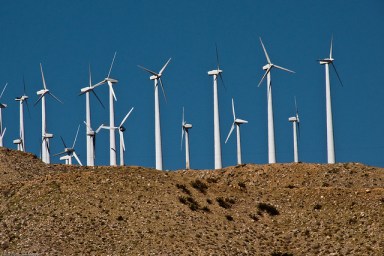Congress fails to renew wind power tax credits

Congress failed to renew wind power tax credits last week. The effects on the fast-growing wind energy industry are expected to be devastating, including major layoffs and delayed or cancelled projects. The current income tax credit of 2.2 cents per kilowatt hour of wind power will now expire at the end of 2012. Wind power proponents tried to get an extension added to the payroll tax cut bill but failed. They could try again but another attempt probably won’t happen until after the November elections (when perhaps they hope Congress will be friendlier to renewable energy).
Unfortunately, November will be far too late. Wind power projects scheduled for 2013 need to be planned now. Without tax credits, their future now seems shaky. However, if a wind power project is operational by the end of the year, it qualifies for the credits. Thus, wind energy will make a short-term and manic push to complete projects by the deadline. But after that, the outcome looks dire.
Consulting company Navigant predicts 37,000 layoffs if credits aren’t renewed and indeed, some wind power companies have already started letting employees go. California led the country last year in new wind power installed. Clearly, any California wind power projects being planned now will be reconsidered (unless they can be completed by the end of 2012). The impact of this on California’s ambitious plan to have 33% renewable energy by 2020 will be substantial, especially since a solar power tax credit is expiring too. That’s right, this is a double hit. It’s a certainty that some and maybe many California wind and solar projects will be cancelled or delayed.
The expiration of tax credits also affects projects that have been completed but not hooked up to the grid. Illinois is second only to California in new wind power installed last year. But almost 14 GW of Illinois wind power, which has already been built, has yet to be connected to the grid. Without the tax credits, much of this power may be delayed from being used or never used at all. 14 GW is a huge amount of power. By comparison, the biggest coal and nuclear plants output 3-4 GW each. We are talking enough energy here to power three million homes or more.
The push to complete wind power construction this year is complicated by it taking 9-12 months to get turbines operational after ordering them. Thus, if a company doesn’t have turbines on order now, they probably won’t be able to complete a project this year. Even if they have, they have little leeway in completing construction. As for projects scheduled for 2013, why would anyone order the turbines now, given the tax credit uncertainty? Thus, in just a few months, orders for wind turbines will probably drop substantially and the manufacturers will start layoffs.
Even as these projects are completed and not speculative – the turbines have to be running to get the tax credits- this is really the spawn of the Solyndra bankruptcy. Solyndra, I predict, will be a major 2012 presidential campaign issue as Republicans try to hammer Obama for lax oversight and cronyism. One of the first rules of politics is that one should never be seen near the accident. Lawmakers, with few exceptions, are backing away from renewable energy subsidies.



